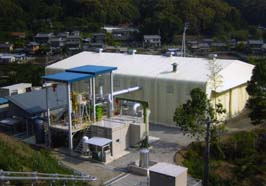Kawasaki Begins Woody Biomass Power Project Testing
May. 18, 2007

| Tokyo, May 18, 2007 – Kawasaki Plant Systems (K Plant) announced today that it has installed and begun testing of its proprietary woody biomass gasification power generation system and pellet production system for a project overseen by the New Energy and Industrial Technology Development Organization (NEDO) in Niyodogawa, Kochi Prefecture. In March 2007, K Plant completed the installation of core facilities including the world’s first small-scale woody biomass distributed power system consisting of a fluidized bed gasifier and a gas turbine as well as a pellet production system that utilizes exhaust heat from the turbine. K Plant followed up with testing one month later for the purpose of evaluating the project’s economic feasibility. The testing is scheduled to be conducted for a period of three years until March 2010. The power generation system employs Kawasaki’s low-calorie gas burning technology using a fluidized bed gasifier and gas turbine. The gasification occurs at a relatively low temperature of approximately 650°C. The generated gas, which contains combustible gas and tar and has a calorific value of 1,000 kcal/Nm3, is directed to the gas turbine combustor while maintaining the same temperature and pressure. This allows for effective use of the tar which would normally have to be removed with water in conventional systems. Thanks to these features, it’s three times more efficient for generating power than direct-combustion biomass power generation systems and can be applied to small-scale woody biomass systems. During testing the system will supply 150 kW of electricity from 0.45 tons/hour of forestry wood waste via the woody biomass gasification power generation system installed on the premises of Sonia Co., Ltd. in Sakawa-cho, Kochi Prefecture. The recovery boiler will supply steam for a wood drier at the facility. Six hundred tons/year of wood pellets will be provided for use as an alternative fuel to four nearby facilities, including a hotel spa and an institution for the handicapped. Kawasaki is committed to contributing to the establishment of a sustainable society through the development and application of technologies and systems that reduce emissions and make efficient use of limited natural resources, such as bioenergy conversion, wind and solar power, and renewable energy. |





